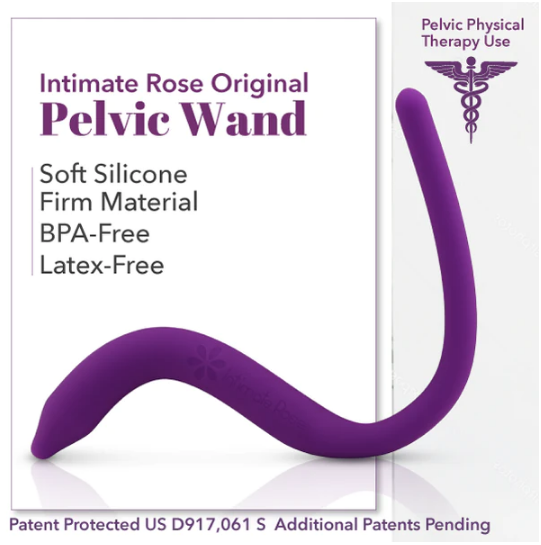How Stress Directly Affects Your Pelvic Floor and What To Do About It
We've all experienced stress. Especially since the whole virus, shutdowns, isolation, and other debacles that have been coming at us from all sides and won't be going away anytime soon.
And while you may not have noticed a direct correlation, I'm guessing you've experienced more than usual pain and maybe some other unusual symptoms over the past few months.
And the pelvic floor is one of those areas, like your shoulders and neck, that is a hotspot for tension when we are stressed.
In this post, I'll be sharing:
How Stress Affects Your Pelvic Floor and Common Stress-Related Symptoms
Wait, are you saying pelvic floor dysfunction is all in my head?
Self-Help Strategies to Cope With Stress and Support Your Pelvic Health
When You Could Use Some Support
Get the Free Printable!
So if you’ve been especially stressed and you’re noticing an uptick in your pelvic floor symptoms - like incontinence, prolapse, or pain, keep reading to find out why it’s happening and what to do about it.
How Stress Affects Your Pelvic Floor and Common Stress-Related Symptoms
The pelvic floor is the group of muscles beneath the pelvis that is important for urination, bowel, sexual function, birthing, and of course maintaining good positioning of the pelvic organs. Perhaps you're quite intuitive and notice that you're more susceptible to pain, illness, and injury when you're under stress. But have you ever considered how stress affects your pelvic floor function overall?
You know how you have a spot (or spots) around you neck or shoulders that seems to get tight and sore? It's that place that always feels good to be massaged and feels like it's in a constant state of tension. Well, turns out the pelvic floor does the same thing on the flipside. It's where your tension is held in the lower half of your body.
Consider what an animal does when it’s scared. It usually cowers, tucks it's tail under, and slinks away right? Likewise, when we are stressed or feeling low, one of our body's first reflexive responses is to curl up and clench our pelvic floor muscles, like tucking our tail under.
This constant state of tension can create tight spots, sometimes called trigger points, within the muscles of the pelvic floor. You may not even associate them as being sore because it doesn't feel the same as a knot in your neck or shoulders. Instead of that sore tight feeling, it can feel more like burning, aching, or even a stinging sensation. It can also feel like hip pain, back pain, tailbone pain, or pain with intercourse. Sometimes it can even feel like a yeast infection or urinary tract infection.
A lot of women have what feels like recurrent yeast (fungal overgrowth) or urinary tract (bacterial imbalance) infections and spend a lot of time getting tests from the doctor. But the cultures come back negative. Strange right? And maybe they get rounds of antibiotics or anti-fungals to try to deal with the issue, but it doesn't work or seems like it works for a bit then comes back worse.
In these cases, it's a good time to step back and wonder if perhaps it's a stress and/or muscular issue causing the pain and discomfort in the first place.
Are These Pelvic Floor Problems All In My Head?
Stress doesn't just cause pelvic pain and tension. It can also contribute to worsening prolapse, incontinence, hemorrhoids, or bowel and bladder dysfunction, like painful bladder syndrome. When stress is a major part of your life, it also affects your hormones and therefore changes your body's pH, response to pain, and ability to heal or ward off illness and injury.
Pelvic dysfunction is a whole body, whole person issue. It's not "all in your head" but the thoughts and feelings in your head do affect your pelvic floor. It's a real, live problem that has a pretty big mind component (as does every other illness btw).
Ongoing stress causes physical pain. And ongoing physical pain causes stress. It's a vicious cycle.
And while it would be nice if we could just de-stress and be done with it, it takes a bit more to untangle the pain response with a whole body approach (since stress affects the whole body) to help the body heal after the stress response. It's kind of like weaning off of a drug. It takes a while for the body to adjust and detox from the stress hormones circulating in the body. And oftentimes it takes support to be able to get back to feeling normal after a season of increased stress.
Self-Help Strategies to Cope With Stress and Relax Your Pelvic Health
But there is much you can do to relieve tension in your pelvic floor during times of stress.
Exercise is one of the best ways to recover from the negative effects of stress.
Things like gentle stretching, walking, and gardening are fabulous ways to help your whole body feel better. Even if you’re too painful or exhausted to “work out,” puttering around a garden or gently strolling outside can work wonders. Exercise helps to reduce pain, stress, anxiety, and actually improves your immune health. Not to mention the physical health benefits and direct effects on the pelvic floor through a greater variety of movements. Varied movement is a win-win for both physical and mental health.
What about targeting the pelvic floor with Kegels? Not so fast! When the pelvic floor is tight already, kegels will make it worse. So if you're peeing your pants and are freaking out because even though you're squeezing hard you're still leaking, it's time to focus instead of relaxing and releasing the pelvic floor.If pelvic floor tension is a problem, a Pelvic Wand from Intimate Rose is an excellent way to release trigger points and help those muscles relax. Be sure to pair it with step-by-step self-release instructions from my e-book - Inside Guide to Pelvic Health.
2. Prayer and Bible study
These forms of Christian meditation help relieve stress as you read through the promises and give your worries to God. Unlike other forms of meditation which only have short-term benefits coupled with negative side effects, prayer and Bible meditation have long-term positive effects as faith grows and you truly leave your burdens in the hands of the Creator.
3. Healthy Lifestyle Habits
Good lifestyle habits support our body's ability to heal by giving it the fuel and tools it needs to detoxify and absorb nutrients. A good sleep schedule, deep breathing of pure air, excellent nutrition and eating habits, cleanliness, healthy clothing, and ditching toxins are all invaluable tools that can make such a huge difference in pelvic floor and whole body health.
When You Could Use Some Support
A trusted friend, supportive group, or counselor can help if you're feeling stressed and can't seem to break the cycle. It can be truly invaluable just to be able to talk through some of what you’re going through and get a fresh perspective.
And if it’s wellness or pelvic health guidance you need, check in with a pelvic DPT or reach out if you want to work with me remotely or in person.
You truly don't have to keep struggling or go this alone.
Note: For educational purposes only. Not to take the place of or be taken as medical advice.
*This post may contain affiliate links to some or all of the products listed. While it will not change the cost to you, I may receive compensation if you choose to purchase through my links. Thank you for your support.








